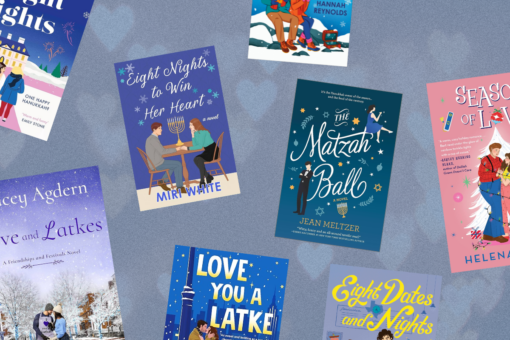To hear her tell it, Chef Liz Alpern didn’t grow up in a “food family.” That is to say, she grew up in a family that loved food and eating, but weren’t big cooks. So it may be surprising that her life’s work is centered on crafting food, community, and communities who share food. Then again, it may not be such a shock.
“The one time that food was a big deal in our life was, of course, the Jewish holidays,” she told me when we sat down to chat several weeks ago at a Brooklyn café (you know, when we were still allowed to do such things), “which is why I think that the Jewish food traditions are so resonant with me. We always ate Jewish food at the holidays. It was a huge deal. It looked like a feast of Ashkenazi delights.”
Ashkenazi delights happen to be Alpern’s jam (pun intended). She is the co-founder of The Gefilteria, alongside partner Jeffrey Yoskowitz, a “cutting-edge food venture at the forefront of the Jewish Food Renaissance.” Basically, they’re reimagining Ashkenazi cuisine for the modern age, starting with gefilte fish and working their way through tzimmis, knishes, borscht, and more. But they’re not just working with the classics — they also have recipes online for dark chocolate and beetroot ice cream and Ashkenazi kimchi (which adds cabbage, turnips, and paprika to the fermented Korean staple). Theirs is a brave new food world that dares to debunk the common wisdom that gefilte fish is a mystery in a jar with questionable jelly and a sad carrot.
Alpern and Yoskowitz also co-authored The Gefilte Manifesto, a collection of recipes which has since become a smash hit. By revisiting the traditional cuisine with love and respect, they’re returning a legitimacy to a cuisine that was all but lost.
When Alpern speaks about Ashkenazi cuisine it’s very clear that this is a labor of love. “I just led a pickling workshop in Long Island close to where my parents live, and so [they] came with all my cousins,” she told me, sipping an espresso. “My mom said, ‘You know your grandmother used to make pickles…’ I didn’t know that but I’m not surprised. [It’s like] I didn’t actually taste the pickles but I did — spiritually.” Alpern strives to channel that legacy while being a unifying energy, a community builder. “The whole point of Jewish food is that we’re sitting around and eating it at important times in our lives,” she says. In other words, the family that eats together is, well, a family.
Speaking of eating together, Alpern’s other initiative is all about bringing folks together to eat, strengthen community ties, and make a difference in the world. Queer Soup Night is what it sounds like — a bunch of LGBTQ folks in a room together eating endless varieties of soup. But there’s a twist: These evenings are fundraisers for local organizations that could use support. It sounds almost too simple, but that’s the magic.
Chef Alpern and her collaborators at QSN HQ, Jen Martin and Kathleen Cunningham, had already been considering an event centered around soup but weren’t sure how to get it going. Then the 2016 presidential election came and went, leaving wreckage and broken spirits in its wake. “I was frozen. I couldn’t talk or move,” Alpern said of this time, looking down at her hands on the wooden table. Thankfully, she did eventually start moving, and she hasn’t stopped since. She expressed a sense that directly after the election, there was “a real urgent need for gathering spaces for the queer community to be in solidarity with one another.” So she made one.
What began as a local once-off queer party in Brooklyn became a national sensation. In a time of uncertainty and disempowerment, QSN provides a way to strengthen communities, support queer folks in the culinary world, and support local organizations doing important work. The organizations being supported are chosen according to very simple criteria: “A functional enough organization [so] that they can send somebody and spread the word [about the event]… and they can prove that they’re doing good work,” according to Alpern, “But also small enough that the money would make a difference.” They’re also always local to the host chapter.
Throughout the fall of 2019 the Brooklyn chapter partnered with Drive Change, a queer-led organization that supports formerly incarcerated folks by training them in the culinary arts, for a series of events. As a result of this ongoing collaboration, the Brooklyn chapter “feels really connected to them [and] we raised something like $7,500.” For a small-ish outfit that’s fighting the good fight, that’s a meaningful sum.
These evenings can be replicated anywhere, and they have been. From Salt Lake City to Miami, from Atlanta to Toronto, there are active Queer Soup Night chapters across the U.S. Alpern shared with me that just before our meeting, she’d gotten an email about a new chapter — in Anchorage, Alaska.
The Gefilteria and Queer Soup Night may seem like very different endeavors, but for Alpern, they stem from the same love for her communities. She doesn’t see these parts of her identity as mutually exclusive. On the contrary, they are spiritually connected; after all, they are both very her, gathering people with the aim of nourishment, both in terms of body and soul.
Due to the recent pandemic, many of these events have unfortunately had to be postponed or cancelled. “QSN HQ and our chapters across the country spent the first month of the crisis putting one foot in front of the other, encouraging folks to take care of themselves and their local communities in whatever ways they needed.” Alpern told me over email. “On March 29, we hosted a virtual QSN to offer our folks a short burst of queer love. Dozens of folks showed up from all over North America. We ate soup and danced together. It was medicine. We plan to continue these virtual gatherings every two weeks or so.”
“I’m extraordinarily interested in maintaining the Jewish community as a force for positivity in the world,” Liz had told me that day in Brooklyn, flashing a bright smile and gesticulating with both hands, “and I don’t really have any ulterior motives. I really care about this culture and I think it has good things that should continue to exist in the world and so we have to keep eating together. And I think with the queer community, it’s the same thing. I really care about the queer community so much. I mean, soup is a food that’s humble, it’s multicultural, it celebrates our diversity within the pot. There’s so many different elements within the pot, and I love that.”
To find out about Queer Soup Night’s next virtual gathering, follow them on Instagram at @queersoupnight or sign up for their newsletter here.
Header image design by Grace Yagel; background images by bortonia / Getty Images.



